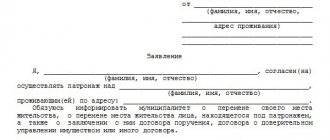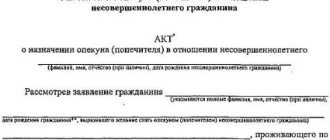Is it necessary to obtain guardianship over an incapacitated person?
In accordance with Art. 31 of the Civil Code of the Russian Federation, guardianship is a way to protect the rights of incapacitated citizens. The guardian must represent the interests of the ward in the courts and government agencies.
Features of registration of guardianship:
- appointed exclusively voluntarily (the guardian must independently initiate the procedure);
- the guardian must meet the requirements established by family and civil legislation;
- the applicant must document compliance with the requirements;
- A guardian is not appointed if the incapacitated citizen is placed in a special institution.
Thus, the appointment of guardianship over an incapacitated person is a mandatory procedure. An exception is provided only for citizens who live in inpatient institutions for the disabled. In this case, the powers of the guardian are vested in the head of the institution.
If a citizen has relatives or other persons who wish to obtain guardianship over him, then they must go through the procedure established by law.
Required list of documents
Guardianship is a responsible step and the state takes it very seriously. Therefore, to obtain status and subsequent benefits, you need to collect certain papers.
To register guardianship, you must prepare the following package of documents:
- a doctor's report on mental illness;
- court decision on incapacity;
- statement;
- a copy of the applicant's passport;
- documents confirming income;
- a doctor's report confirming the satisfactory physical and mental condition of the applicant;
- written confirmation of the consent of all adult family members to live with the future ward;
- marriage or divorce certificate;
- detailed biography.
Types of guardianship over the incapacitated
In 2021, the law provides for the following types of guardianship over an incompetent person:
- Free. The guardian receives no remuneration. The pension and other income of the ward are transferred to the nominal account of the guardian. He spends them to meet the needs of the incapacitated. The report on expenses made is carried out annually, until February 1.
- Paid. Carried out on the basis of an agreement between the district administration and the guardian. As a remuneration, the guardian receives a certain amount from the pension or other income of the ward, which cannot exceed 5% of the total income.
How to obtain guardianship for a disabled person?
How to obtain guardianship of a child with living parents?
Cancellation of guardianship rights
Independent termination of guardianship is possible only upon the death of the guardian or ward. In other cases, representatives of the PLO must have good reasons for this:
- The person appointed for guardianship is no longer able to fulfill his duties due to deterioration in health, for example, if he became ill with a severe infectious pathology, became disabled, or was forced to move.
- The ward has become dangerous to others or himself, which is the reason for his transfer to a special medical institution.
- The judge made a decision to restore legal capacity at the request of the guardian or guardianship officials.
- The person who has been granted guardianship rights fails to cope or abuses the responsibilities.
A representative of the PLO, citing the grounds for annulment of guardianship, has the right to submit an application to the prosecutor's office or the district court department. Further actions depend on the circumstances of the case.
A person who wants to care for a mentally ill citizen who has been declared incompetent by a court must submit an application to the OOP staff. They will familiarize themselves with the situation and, upon approval of the candidacy, will grant the applicant guardianship rights. The responsibilities of the guardian will include caring for the ward and representing his interests. As compensation, the state will provide certain benefits and payments to the person caring for a mentally ill person.
How to obtain guardianship over incapacitated people?
The trial to deprive citizens of legal capacity takes place with the mandatory participation of specialists from the guardianship department. After the court decision enters into legal force, the document is sent to the guardianship department. From this moment on, specialists must select a legal representative for the citizen.
Depending on the situation, the following may act as a guardian:
- relatives;
- strangers;
- head of a specialized organization.
The relatives of an incapacitated citizen have priority when choosing a guardian. But they must also express their desire and collect documents.
If you want to arrange guardianship for an elderly relative, you must follow the following procedure:
- Collect documents.
- Deprive of legal capacity.
- Contact the guardianship department.
- Receive a decision on the appointment of a guardian.
The procedure is carried out free of charge. There is no need to pay at any stage.
The duration of guardianship is calculated individually. On average, the procedure will take no more than 4 months.
Deprivation of legal capacity
The issue can be resolved exclusively in court.
You need to prepare the following documents:
- the patient's civil passport;
- outpatient card;
- medical documents confirming registration with a psychiatrist;
- petition for the appointment of a medical examination.
Important! The plaintiff must prove in court that the patient cannot understand the consequences of his actions. To do this, you need to collect all medical information. It is advisable to conduct an examination with a psychiatrist in advance.
The trial takes about 2 months (1 month for the preparation of the process and 1 month for the court decision to enter into legal force). A citizen may be declared incompetent if he has a mental illness or senile dementia (dementia).
List of documents for registration of guardianship
From the moment the court decision is made, it is necessary to begin collecting documents for the appointment of guardianship. The list is provided for by Decree of the Government of the Russian Federation of 2010 No. 927.
When registering guardianship over incapacitated citizens, the following categories of guardians are distinguished:
- relatives who lived with the incapacitated citizen for at least 10 years;
- other citizens.
For the first category, a preferential registration procedure is provided.
They must provide the following data:
- statement;
- document confirming marriage (if the applicant is married);
- passport;
- medical report on health status;
- information about kinship.
Only children, parents, brothers, sisters, grandchildren, and grandparents of the incapacitated person can be included in this category. A prerequisite is cohabitation for a period of at least 10 years.
The second category includes relatives who do not live with the potential ward, and strangers.
They must provide the following information to the guardianship department:
- passport;
- statement;
- autobiography;
- document on the conclusion of a marriage union;
- written consent of all members of the applicant’s family to register guardianship, aged 10 years or older;
- medical report;
- information about the level of income for the last 12 months.
Important! If a citizen is a non-working pensioner, then he does not provide information about income. The guardianship department independently orders a certificate from the Pension Fund.
All documents are valid for 1 year, and the medical certificate is only 3 months. This fact must be taken into account when preparing documentation.
Documents are submitted to the guardianship department at the place of registration of the guardian. But to appoint guardianship, you need to contact the department at the place of residence of the incapacitated person.
Sample consent of relatives for guardianship of an incompetent person: alt: Consent of relatives for guardianship of an incompetent person
Requirements for a guardian
The law makes a guardian responsible for the life and health of another person. Therefore, there are a number of requirements for the identity of the representative.
A citizen cannot:
- Be deprived of parental rights, limited in them, removed from the duties of a guardian, deprived of the status of an adoptive parent for guilty actions in relation to the adopted child.
- Have a criminal record against the life and health of citizens, for serious and especially serious crimes, outstanding convictions.
- Have diseases provided for by Government Decree No. 117 of 2013.
- Be registered as an alcoholic or drug addict.
- Be married to an incapacitated citizen or to a person of the same sex.
The applicant must be of legal age and legal capacity.
His moral qualities are also taken into account. Although the law does not explain what exactly this is about. In practice, specialists from the guardianship department ask for references from neighbors or from their place of work.
Application for appointment of guardianship
The application can be submitted to the guardianship department at the place of registration of the incapacitated citizen in the following way:
- personally;
- by mail;
- through a representative;
- through the MFC;
- through the website of the guardianship department (if technically possible).
In a number of regions, it is possible to submit an application through the State Services electronic portal. This service must be specified individually for each subject of the Russian Federation.
For example, residents of Moscow can submit an application electronically, but residents of the Novosibirsk region cannot.
The law does not establish an application form for the appointment of guardianship over an incompetent person.
However, the document must include the following information:
- name of the municipality;
- applicant's details (full name, passport details, address, contact phone number);
- title of the application;
- request to be appointed as a guardian;
- information about the potential ward;
- information about the applicant's criminal record;
- details of the applicant's family members;
- additional information;
- permission to process the applicant's data;
- list of documents;
- date and signature.
Sample application for guardianship of an incompetent citizen: alt: Application for guardianship of an incompetent citizen
Caring for a person who needs constant outside supervision for health reasons
Let's talk about what kind of care a pensioner requires in connection with his physical and mental problems.
Health is deteriorating every year. If in youth most people are mobile and rarely suffer from any illnesses, then with the onset of old age more and more diseases accumulate, including chronic ones. If a person has already been declared incompetent and guardianship has been established over him, it means that the condition of his body is far from ideal. To protect the person under your care from new diseases when caring for him at home, you must consider the following :
- One of the most important aspects of preventing any disease is physical activity. The person being cared for should exercise every day depending on their condition;
- The same applies to performing various household chores: there is no need to exempt the person under guardianship from actions that he is able to perform.
- The basis of psychological comfort is a respectful and friendly attitude from others.
A number of rules will help in caring for an elderly relative.
- Both caregiver and patient will benefit from thinking through their daily routine. An old person must be busy with things that are interesting and useful to him, including so that the trustee can fulfill the duties assigned to him.
- Even in cases where a person is declared incompetent, he may retain a number of physical and mental capabilities for a long time. The helper must help realize this potential in order to preserve the patient's sanity longer.
- The patient's living conditions should be as safe as possible. The house should not contain sharp objects, toxic substances, or devices that could be used by an old person to injure himself or someone else.
- It is better to leave the environment familiar to the old man, in which he feels calm and easily navigates.
- Particular attention should be paid to the convenience of equipping the bathroom. We need to try to make it easier for him to independently perform his natural needs and wash himself. To do this, handrails are installed in the bathroom and rubber mats are laid out. If a person has problems with nighttime diuresis, it is worth limiting his drinking in the evening.
- Furniture and various household items should be as adapted as possible to ensure that a person can perform some actions without anyone’s help. To do this, you can lay out things in the closet in a certain order, use clothes with Velcro, and easy-to-put-on shoes.
- It is necessary to work with the person under your care and give some work during the day, including to ensure sound sleep.
- Be patient and try to treat the old person with kindness and respect.
American doctors say that an unfavorable atmosphere in the family may be the cause of age-related diseases. They found that in families consisting of two spouses, the depressive state of one can easily be transmitted to the other, even if the partner has no reason for its occurrence.
A study was conducted in the United States in which more than 1,200 married couples over the age of 65 took part. The goal of the program was to establish a number of conditions that influence the occurrence of cardiovascular diseases in retirement age. Scientists have concluded that one of these factors may be the occurrence of a depressive state in one of the spouses, which extends to the other. It has been established that a negative vision of the world, lack of desire for activity and poor health, which affects one of the family members, eventually manifests itself in the other.
Experts state that 10% of people after 65 years of age become sedentary, their social contacts and activities decrease. Often this leads to the fact that over time a person is declared incompetent. However, with sufficient support from loved ones, this condition occurs less frequently.
Read material on the topic: Sanatorium for retirees
Payments and benefits to the guardian of an incapacitated person
Guardians of incapacitated persons do not enjoy federal and regional benefits.
At the same time, they have the right:
- To receive a monthly payment from the Pension Fund of the Russian Federation. If the ward is over 80 years of age or is a disabled person of group 1, then the Pension Fund, at the request of the guardian, monthly transfers 1200 rubles together with the ward’s pension.
- To receive a reward. At the request of the guardian, the guardianship department may enter into an agreement for the performance of duties for a fee. The amount cannot exceed 5% of the ward’s total income. As a rule, the only income of the incapacitated person is a pension.
- To obtain benefits and subsidies that are intended for the ward. If a disabled person has the title of Labor Veteran, Honorary Donor or other titles, then he is entitled to benefits. If the guardian lives in the ward’s apartment, he can apply for a subsidy for utilities.
Thus, having lost legal capacity, a citizen is not deprived of state and regional benefits. But the responsibility for their execution is transferred to the guardian.
Requirements for candidates
A person who wants to become a guardian of a mentally ill citizen must have certain personal qualities (patience, attentiveness) and meet the requirements of the guardianship authorities:
- do not suffer from infectious pathologies;
- have no criminal record and no addictions (alcohol, drugs);
- be over 18 years of age;
- have housing suitable for maintaining the ward;
- obtain a certificate of absence of life-threatening diseases;
- be willing to perform their duties voluntarily.
If the candidate’s parental or guardianship rights were previously taken away, the guardianship authorities will be forced to reject the application. If all criteria are met, the likelihood of a positive decision is high.
Control over guardians of incapacitated citizens
From the moment guardianship is appointed, guardianship department specialists must monitor how the citizen fulfills his duties.
The law provides for the following options for checking guardians:
- Personal supervision. Carried out in the form of scheduled unscheduled inspections at the place of residence.
- Documentary checks. Every year, before February 1, the guardian submits a report on the safety of the property of the incapacitated person.
The procedure for carrying out personal checks varies depending on the status of the guardian:
- relatives who lived with the ward for at least 10 years - once every 1 year and then once every 3 years;
- other citizens - once within 30 days from the date of the order, in the first year - quarterly, subsequently - once every six months.
If a signal is received about improper performance of duties, specialists can visit the family outside captivity. For this purpose, a special order is issued.
Liabilities
A mentally ill citizen who is found incompetent during a trial must be under the constant supervision of a responsible person appointed by the PLO. The list of responsibilities of a person who has received guardianship rights is as follows:
- Conclude transactions and conduct business on behalf of your ward. Usually the point is about representing rights in court, purchasing basic necessities and paying utility bills.
- To care for the person under care, that is, to monitor his health, hygiene, living conditions and nutrition. The caregiver will have to do laundry, cleaning, and cooking as needed.
- Use the funds of a mentally ill person to meet his needs. An expense report is compiled towards the end of the year and submitted to the guardianship authorities.
If a person authorized to care for an incapacitated person discovers partial or complete restoration of the consciousness of the ward, then a petition is filed for a medical examination. If positive changes are identified, it is possible to return the status “competent” through the courts.
According to Art. 1076 Civil Code, people caring for mentally ill citizens are required to be responsible for the actions of their wards. Any damage caused by an incapacitated person must be compensated by his guardian.
How to refuse guardianship of an incapacitated person?
The guardian performs his duties on a voluntary basis. In the event of a change in life situation (illness, job loss, divorce) or a bad relationship with the ward, the guardian can issue a refusal. To do this, you need to contact the guardianship department at the location of your personal file. The guardian submits an application in which he requests release from duties.
On the one hand, he is not obliged to explain the reasons for his decision. On the other hand, experts will probably ask him to do this. Since the decision to perform the duties of a guardian is entirely voluntary, no one can force a citizen to maintain his status.
The law does not provide for setting a specific deadline for making a decision. Therefore, after accepting the application, the local government body must urgently issue an act on the release of the guardian.
At the time of submitting the application, the citizen must:
- submit all original documents of the ward;
- submit an order for appointment as a guardian and a certificate;
- submit a report for the past period (but no later than 3 days from the date of receipt of the release order).
From the moment the order is received, mutual rights and obligations between the guardian and the ward cease. An incapacitated citizen comes under the supervision of the district guardianship department.
The legislative framework
A legal framework has been created to regulate the legal relations of a guardian, ward, guardianship authorities, and other departments working with this category of citizens. It includes the following acts:
- Federal Law on guardianship and trusteeship (Articles 11, 17, 20, 26);
- Civil Code (Article 29),
- Code of Civil Procedure (Articles 281, 282, 283, 284);
- Law on Psychiatric Care (Articles 4, 10, 29).
You may be interested in: Registration of guardianship over an incapacitated elderly person
The mechanism and legal basis for establishing guardianship are reflected in these legislative norms. They are aimed at eliminating controversial issues in the activities of guardianship authorities, maintaining the quality of life of incapacitated citizens, and the proper performance of duties by legal representatives.










